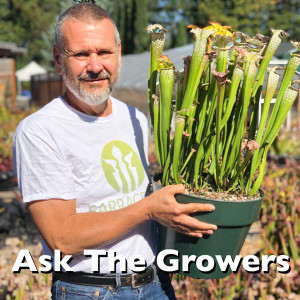June 11, 2023
Q/A #93 - Deformed Pitchers on a Sarracenia
QUESTION:
My Sarracenia Don's Flava has a serious tendency to produce deformed traps. None of the other Sarracenia I have do this, and I have a lot! All grown with the tray method, western Oregon sun, peat/ perlite mix. What gives? Is this variety more vulnerable to something?
(Submitted in June 2021.)

RESPONSE BY JEFF DALLAS:
This type of growth is caused by aphids and thrips. When they attack new growth, the leaf becomes deformed as it develops. Get a magnifying glass and look carefully at the damaged areas, especially on the new growth to see if you can see any bugs. You are probably familiar with aphids, but thrips will look like tiny long black bugs that will be on newer growth or depressions in leaves. Aphids tend to attack more in early Spring, and thrips are more common in hot dry weather.
I recommend using a ready-to-use Neem product, which you can find at most garden centers. The product is completely safe to use on Sarracenia as long as you follow the directions on the label. You will need to apply at least three sprayings spaced 2 days apart.
When spraying your plant, move it to a shaded location. Do not spray while the plant is in direct sunlight as this may burn the leaves. The ideal time to spray is early evening when the sun is lower in the horizon. This will also allow the Neem to sit on the leaves overnight and do its magic on thrips and aphids. The product is also deactivated in UV light, which is why it's best to spray in early evening if possible.
I know your other plants are not affected. We see this happen with our plants, too. One plant can be deformed from pests, but the plant next to it is completely normal, even of the same variety. The important things to know are the signs of pests and treatment options.
• The original question and response have been edited for publication.
• With a database of thousands of questions, we will post a Q&A every few days or so.
• To search for similar posts, click on a hashtag below or use the site's search function.
• To submit a carnivorous plant question, visit Ask the Growers.

